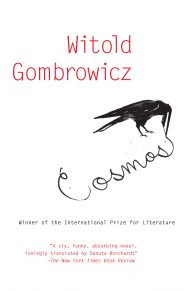“Eighty-five years after the Nazi invasion of Poland interrupted its original serial publication, Gombrowicz’s second novel receives its first complete Polish-to-English direct translation . . . Crumbling antiquity, petty scheming, romantic comedy of manners—these are the foundations of an unpredictable gothic pastiche, both brazenly funny and deeply spooky. The short paragraphs fly by, buzzing with intrigue and danger . . . Lloyd-Jones’ translation crackles with choice phrases, deftly capturing Gombrowicz’s gorgeous scenic descriptions, mordant sense of humor, and evocations of lurking horror. A delightful revelation of an interbellum novel from one of the great Polish modernists.”—Kirkus Reviews (starred review)
“This 1939 treasure from Polish modernist Gombrowicz, available in its entirety for the first time in English, involves a young tennis coach entangled in intrigue and supernatural phenomena . . Gombrowicz fills the plot with genre tropes . . . What emerges is a crafty and sharp exploration of the greed, lust, and vanity that spin people out of control. Gombrowicz’s gleeful misanthropy and sense of the absurd shine through the genre trappings to create a potboiler that’s enjoyable on multiple levels. This works perfectly both as a straightforward gothic akin to De Maurier’s Rebecca and as a knowing parody.”—Publishers Weekly (starred review)
“Gothic themes and melodramatic flourishes dramatize a modernist novel preoccupied with the
fluidity of identity . . . In allowing the utter weirdness of the great Polish modernist to shine through, this new English translation by Antonia Lloyd-Jones, best known for her translations of Nobel laureate Olga Tokarczuk, may invite reassessment of its place in his oeuvre.”—Booklist
“[A] seriously good comic novel . . . Exuberant, playful, insincere, sometimes haughty, Gombrowicz was one of Poland’s greatest modernist writers . . . Brimming with unruly, high-octane prose, the book has the hallmarks of a classic gothic story: a haunted castle, a mad prince and his conniving secretary—and, of course, treasure. At first glance, this surface is rather depthless, but look closer and you’ll see the philosophically minded Gombrowicz getting on with what he described as the central aim of his writing: ‘to forge a path through the Unreal to Reality.’”—Matthew Janney, Financial Times
“A master of verbal burlesque, a connoisseur of psychological blackmail, Gombrowicz is one of the profoundest late moderns, with one of the lightest touches.”—John Updike
“[A] great Polish writer . . . Extravagant, brilliant, disturbing, brave, funny . . . A masterpiece.”—Susan Sontag, on Ferdydurke
“In him, for the first time, Polish literature produced a writer to whom the agonies of being Polish were less important than the tragicomedy of being human.”—Times Literary Supplement
“Probably the most important 20th-century novelist most Western readers have never heard of.”—Benjamin Paloff, Words Without Borders
“Borchardt’s graceful, powerful, and inventive translation is a great gift to all lovers of Witold Gombrowicz’s quirky prose.”—Jaroslaw Anders, on Cosmos
“[Cosmos] will hold special appeal for fans of Camus’s The Stranger. In this deft new translation, Cosmos reveals itself as a challenging but important work.”—Frank Sennett, Booklist (starred review)
“Cosmos is a compulsively unsettling philosophical drama veiled as a quotidian mystery . . . Borchardt’s new English translation conveys a world wrought with an interconnectedness, or perceived interconnectedness, that struggles to understand meaningfully a series of events that defy logical association.”—David Thomas Holmberg, Rocky Mountain Review of Language and Literature
“[A] sly, funny, absorbing fourth novel and lovingly translated by Danuta Borchardt.”—Neil Gordon, New York Times Book Review, on Cosmos
“Pornografia is animated by an unconcealed pain, and that is what lifts it above the ordinary run of modernist invention and makes it poignant and relevant today . . . It is a book about the universal longing for the time we have lost by growing old. Does it matter that it is a reformulation of something that already preoccupies us? What we ask of art is that it should present a familiar thing in a new and striking way, and that is what Pornografia does.” —Aaron Thier, The New Republic
“A grotesque evocation of obsession . . . Gombrowicz is a relentless psychoanalyzer and a consummate stylist; his prose is precise and forceful . . . Borchardt’s translation (the first into English from the original Polish) is a model of consistency, maintaining a manic tone as it navigates between lengthy, comma-spliced sentences and sharp, declarative thrusts.” —Publishers Weekly (starred review), on Pornografia
“Borchardt . . . spins out a web of words that vibrate with unholy energy.” —Kirkus Reviews, on Pornografia
“Gombrowicz’s fiction is hyperactive, grotesque, philosophical, juvenile, lyrical, serious, ironic, existential, and confrontational—in other words, it harnesses just about every technique that a fiction writer could hope to master . . . English language readers who have been lucky enough to pick up and enjoy Gombrowicz in the last ten years probably have Danuta Borchardt to thank.” —Luke Sykora, Rain Taxi, on Pornografia
“Danuta Borchardt brings Gombrowicz’s great novel to us with a force and beauty English-language readers have not felt before. Deception and illusion, savagery and high mindedness, fire and ice, desire and impotence: such are the antinomies that anchor this wildly believable and yet improbable fiction, and all are captured exactly in the crystalline sentences of a translator who is herself a masterful stylist.” —Robert Boyers, editor of Salmagundi and Director of the New York State Summer Writers Institute, on Pornografia
“The creepy genius of Witold Gombrowicz’s Pornografia is the acute, believable, and unavoidable awareness that there is another universe right inside the ‘real’ one that is fighting with it. What’s more, the ‘real’ world becomes increasingly less believable as the invisible one takes possession of it. This is High Gothic and brilliant psychological drama, while it is also, true to its title, profoundly (but not vulgarly) pornographic. One of the 20th century’s truly great writers, Gombrowicz is lucky to have found a first-class translator in Danuta Borchardt, who understands and communicates an eeriness rare in English.” —Andrei Codrescu, author of The Posthuman Dada Guide: Tzara and Lenin Play Chess
“Gombrowicz is the antithesis of Borges and the godfather of Bolaño. Who would have thought that a Polish émigré could become such a superb Argentine writer?” —Ilan Stavans, Professor of Latin American and Latino Culture, Amherst College
“[A] satisfying literary and emotional experience.”—H.B. Segal, Saturday Review, on Pornografia
“Danuta Borchardt . . . is faithful to the substance of the original and gives the reader a good, zesty flavor of Gombrowicz’s inspired idiosyncrasy . . . A genuinely astonishing masterwork.”—Eva Hoffman, New York Times Book Review, on Ferdydurke
“Exuberant humor . . . Suggesting the absurdist drama of Eugene Ionesco, if not the short fiction of Franz Kafka.”—Library Journal, on Ferdydurke
“A wonderfully subversive, self-absorbed, hilarious book. Think Kafka translated by Groucho Marx, with commentaries.”—Kirkus Reviews, on Ferdydurke
“Gombrowicz’s language . . . subverts language and ideas to a cosmic meltdown, as if in a fun-house mirror. Gombrowicz manages to befuddle, amuse, insult and astonish with this tale of exile, uprootedness and identity.”—Susan Miron, Boston Globe, on Trans-Atlantyk















